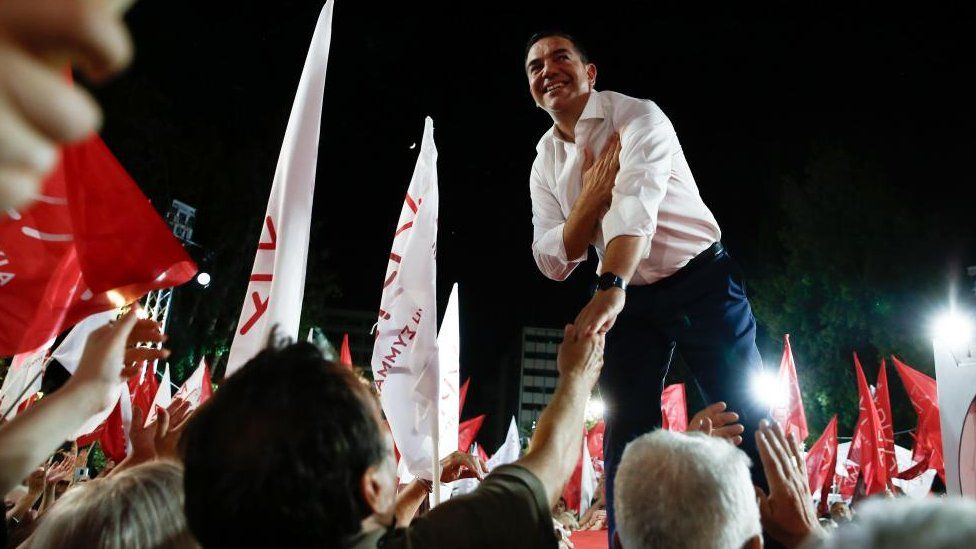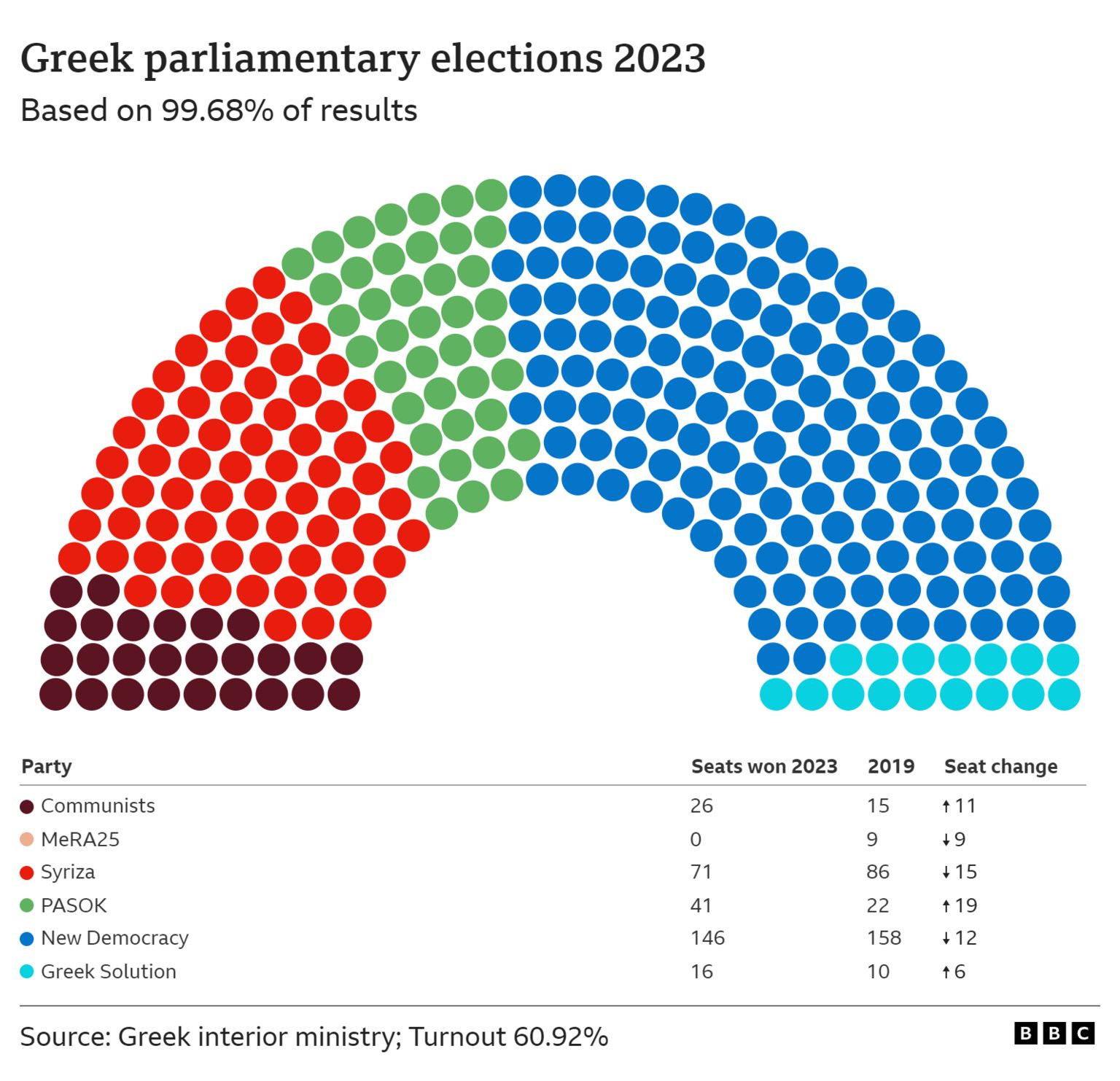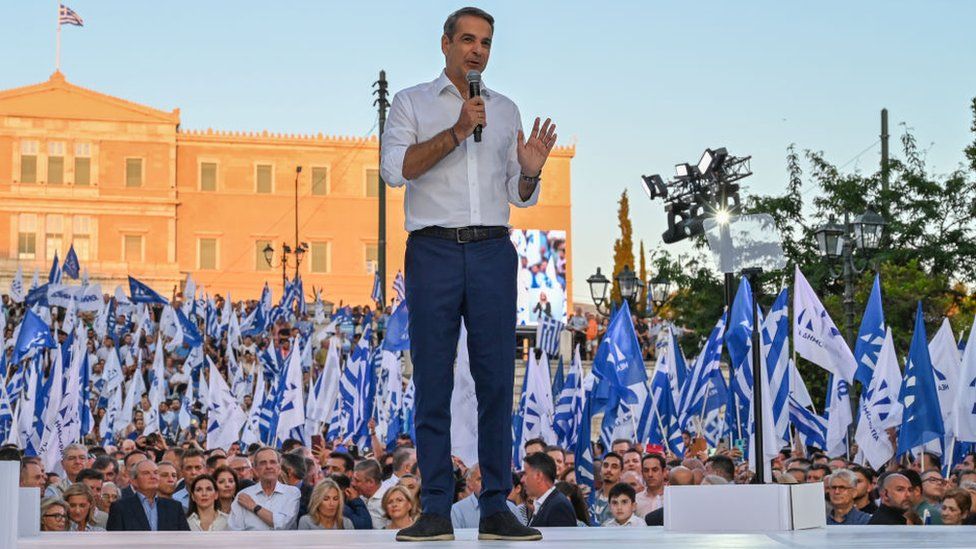On Sunday, Greeks will cast ballots for the second time in a month, with conservative former prime minister Kyriakos Mitsotakis hoping to win a sizable majority.
In an effort to rule Greece alone, he called new elections after soundly defeating his center-left rival in May.
The vote occurs a little more than a week after a tragedy involving a migrant boat off the coast of Greece, where it is estimated that 500 people perished.
The disaster, however, hasn't had much of an impact on the campaign.
The center-left Syriza party of Alexis Tsipras, another former prime minister, was defeated by Mr. Mitsotakis' conservatives by a 20-point margin in last month's elections, and he is confident of a repeat victory that would grant him a second term.
However, he asserts that his New Democracy party is unable to form the necessary stable government without a majority of more than 150 in the 300-seat parliament.
At a rally on Friday night in Syntagma sq\. in the heart of Athens, he declared, "Greece needs a government that will not depend on fragile majorities.
A similar repeat victory would grant him the mandate he seeks because the main distinction in Sunday's election is that the winning party receives up to 20 to 50 bonus seats.
After a severe debt crisis and three foreign bailouts, Mr. Mitsotakis is widely regarded as having successfully restored stability and growth to the Greek economy. Despite the fact that many Greeks are experiencing a cost-of-living crisis, voters chose to support the party last month despite its promises of lower taxes and improved public health.
In the past year, he has avoided a number of damaging crises, including a rail accident and a wiretapping scandal that resulted in the resignation of the intelligence chief and his own nephew, who served as the prime minister's chief of staff. He has earned the reputation of being a Teflon-coated leader.
It will be difficult for his center-left rival. In Thessaloniki, Alexis Tsipras spoke to supporters and said that voters had a choice between two visions of Greece: "a country and society of humanity, democracy and justice" or a right-wing program that prioritized the views of the few over the lives of the many.

When a migrant boat capsized 11 days ago off the south-west coast, the two leaders responded in very different ways.
Greece observed three days of mourning, and the campaign abruptly came to an end. Concerns have been raised about the Greek coastguard's response in the hours before hundreds of people perished.
Mr. Mitsotakis vehemently defended the coast guard and denounced people smugglers as "scum.".
But Mr. Tsipras did voice some worries.
He claimed that the coastguard, police, and military had all operated "with one objective, human life" during his tenure as commander during the 2015 European migrant crisis, when more than a million people passed through Greece.
Most Greek voters now favor stricter, more conservative policies as a result of the migrant crisis, according to Panos Koliastasis, an assistant professor of politics at the University of Peloponnese.
"The cause stems from the Evros migration crisis in 2020, when the Mitsotakis government reacted quickly after Turkey attempted to forcibly eject thousands of migrants onto Greek soil. The majority of the populace therefore sees the immigration issue as an external danger to national sovereignty. ".
The fragmentation of the Greek left benefits Mr. Mitsotakis as well. The old Socialist Pasok party gradually lost support from left-leaning voters in favor of Alexis Tsipras's more dynamic approach as the debt crisis worsened in 2012.
But under a Tsipras administration, Syriza's support declined, and the Socialists are now Greece's third-largest political party. Both of the left-of-center parties have ruled out forming a coalition with the conservatives.

With an increase in his vote share since the 2019 elections, the leader of New Democracy is unusual in Greek politics.
More than 30% of voters aged 17 to 34 who used TikTok and other social media platforms to engage with voters helped him win the youth vote as well.
Panos Koliastasis brings up a statement made by Mr. Mitsotakis in November of last year, in which he told journalists that his campaign for the 2023 elections began the day after he won the previous one in 2019.
He claims that hardly a day passed without Mitsotakis holding a press conference, giving an interview, or going abroad.
His emphasis on sending out positive messages seemed to resonate with Greek voters, who seemed more concerned about the economy and living standards than they were about inflation or the worst rail accident in Greek history, which occurred in February and claimed 57 lives, many of them students.







